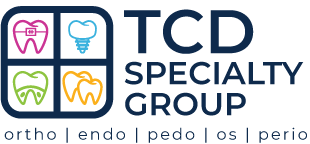Frequently Asked Questions
Clear answers about appointments, insurance, imaging safety, and treatment across our specialties.
Browse FAQs
General · Appointments · Insurance & Billing · Imaging & Safety · Treatment & Recovery · Endodontics · Oral Surgery · Periodontics · Orthodontics
General
Do I need a referral to be seen?
No—self-referrals are welcome. If your dentist referred you, bring any x-rays or forms they provided (we can also request them directly).
Which specialists are on your team?
Endodontics, Oral & Maxillofacial Surgery, Periodontics, and Orthodontics. See Meet Our Specialists.
What should I bring to my first visit?
Photo ID, insurance card (if using insurance), medication/allergy list, and any referral paperwork. New-patient forms are online at For Patients > Forms.
Do you see emergencies?
Yes. We hold time daily for urgent pain, swelling, or trauma. Call—same-day care is often available.
Appointments
How long will my appointment take?
Consultations: 30–45 minutes. Treatment varies—e.g., many root canals 60–90 minutes; surgical visits can be longer. We’ll review timing at your consult.
Can I complete forms in advance?
Yes—use online forms to speed check-in.
What is your cancellation policy?
Please give at least 24 business hours to reschedule; late cancellations or no-shows may incur a fee.
Insurance & Billing
Do you accept my insurance?
We work with many plans and verify benefits as a courtesy. Coverage varies by procedure. We’ll review an estimate before treatment and offer flexible payment options for uncovered portions.
What payment methods do you accept?
Major credit/debit cards, HSA/FSA cards, and available financing. Co-pays/deductibles are due at service.
Will I receive a pre-estimate?
Yes—after verification we provide an estimate; final amounts depend on insurer processing.
Imaging & Safety
Are dental x-rays and 3D CBCT safe?
Yes. We follow ALARA protocols and use modern digital systems with low doses. 3D scans are used only when they add meaningful diagnostic value.
What infection-control measures do you follow?
CDC/OSHA guidelines: autoclave sterilization with biological monitoring, single-use disposables where appropriate, documented room turnover, and ongoing team training.
Do you offer sedation?
Yes—options vary by procedure and medical history (nitrous, oral, or IV sedation in select cases). Your specialist will recommend the safest, most comfortable option.
Treatment & Recovery
Will treatment hurt?
We use modern anesthesia and gentle techniques; we check in frequently. Some post-procedure soreness is normal and usually managed with OTC medication.
How soon can I eat after my procedure?
Wait until numbness fully wears off, then start with soft foods. Follow your printed after-care instructions.
Where can I find after-care instructions?
Printed guides are provided at your visit and available at For Patients > After-Care.
Endodontics
Do I always need a crown after a root canal?
Back teeth typically benefit from a crown to prevent fracture. Your general dentist will advise on timing—often within 2–4 weeks.
Can a root canal be done in one visit?
Often, yes. Complex infections/anatomy may benefit from medication between visits. We’ll recommend the best approach for healing.
Oral Surgery
How long will I be swollen after an extraction?
Swelling usually peaks at 48–72 hours and improves thereafter. Ice, head elevation, and prescribed meds help. Detailed after-care is provided.
When can I return to work or school?
Many patients resume light activity in 1–2 days for routine extractions; more complex procedures or sedation may require longer. Your surgeon will advise.
Periodontics
Am I a candidate for dental implants?
Many are. We assess bone, gum health, and medical history. If needed, grafting can prepare the site for a stable long-term result.
How do I care for my gums after treatment?
Gentle brushing, interdental cleaning (floss/water flosser), and rinses as directed. We’ll provide a personalized maintenance plan.
Orthodontics
What age should my child see an orthodontist?
The AAO recommends a first check-in by age 7 to screen growth/spacing. Early treatment isn’t always needed, but monitoring helps.
Do you offer clear aligners?
Yes—clear aligners and advanced bracket systems are available. We’ll match the option to your goals and lifestyle.
Still have questions?
Our team is happy to help by phone, secure message, or a quick in-person consult.

